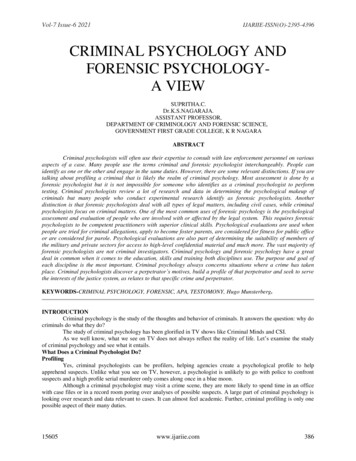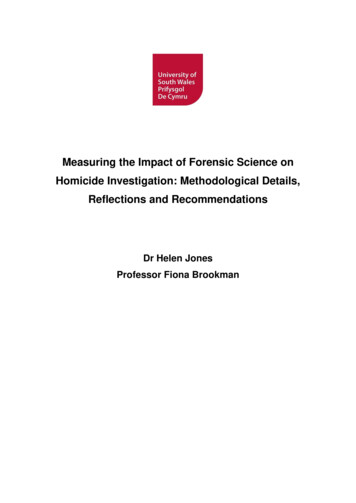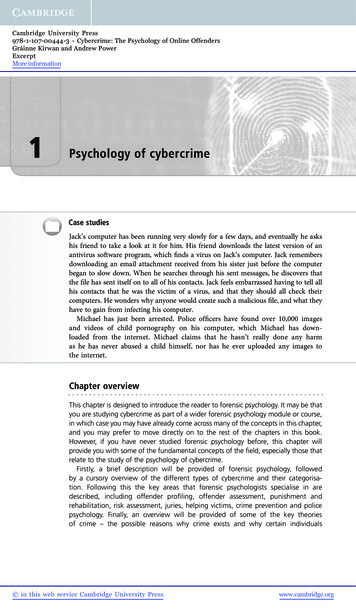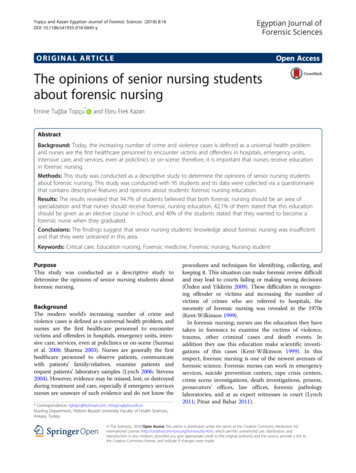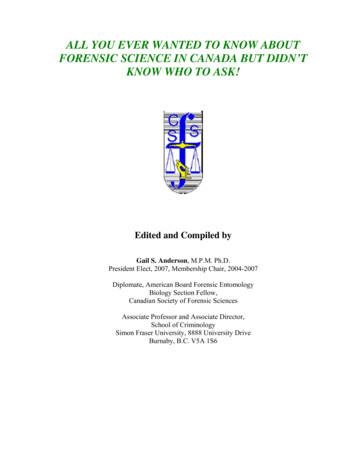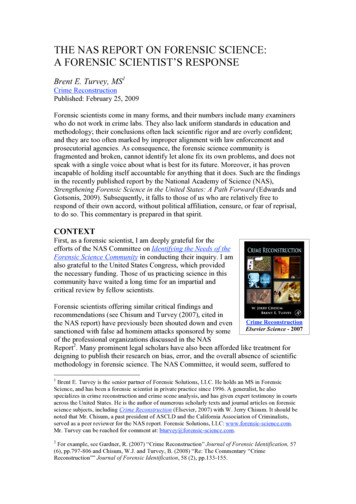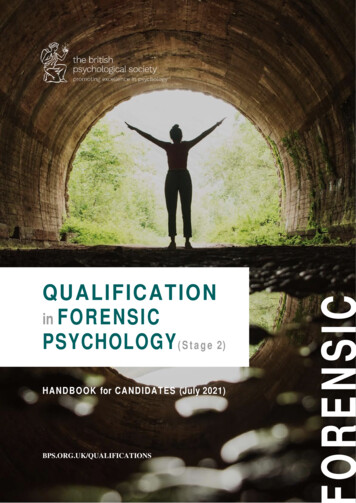
Transcription
HANDBOOK for CANDIDATES (July in FORENSICPSYCHOLOGY ( S t a g e 2)
C O N T A C T USIf you have any questions about the Qualification inForensic Psychology (Stage 2), please feel free tocontact the Professional Development Delivery Team.Email: forensic.qualification@bps.org.ukTel: 44 (0)116 252 9505Our address is:Professional Development Delivery TeamTheBritish Psychological SocietySt Andrews House48 Princess Road EastLeicesterLE1 7DRIf you have problems reading this document becauseofa visual impairment and would like it in adifferent format, please contact us with yourspecific requirements.t: 44 (0)116 252 9523; e: P4P@bps.org.uk.For all other enquires please contact the Society on: t: 44 (0)116 254 9568; e: info@bps.org.uk 2021 The British Psychological SocietyAll rights reserved. No part of this publication may be reproduced ortransmitted in any form or by any means, electronic or mechanical,including photocopy, recording or any information storage retrieval system,without permission in writing from the publisher.
1. WELCOME51.1Introduction51.2Eligibility for registration51.3Scope of forensic psychology51.4Training as an independent candidate61.5Aims of the QFP (Stage 2)71.6Structure and level of forensic psychology training72. ABOUT US82.1Forensic Psychology Qualifications Board82.2Professional Development & Assessment Department82.3Assessor Team93. ENROLMENT103.1Eligibility to enrol103.2Engaging a Co-ordinating Supervisor103.3Planning your training123.4Time requirements of supervised practice173.5Length of enrolment173.6Undertaking some of your training outside of the UK183.7How to apply to enrol193.8Monitoring progress233.9Fees and payment options233.10 Interruptions from the qualification243.11 Withdrawal from the qualification244. PROGRAMME OF TRAINING AND SUPERVISION254.1Contact with your Co-Ordinating Supervisor254.2Additional Supervisors254.3Changing your Supervisor264.4Quarterly supervision plans264.5Updating your plan of training264.6Practice Diary274.7Competency Logbook294.8Ethics and professional conduct304.9Consent314.10 Support for CandidatesFORENSIC PSYCHOLOGYCONTENTS323Handbook for Candidates (July 2021)
FORENSICPSYCHOLOGY5. ASSESSMENT335.1Deadline for submission335.2Extensions to submission deadlines345.3How to submit345.4Exemplar reports375.5Supporting evidence395.6Submitting work for assessment395.7Viva assessment405.8Outcome of assessment415.9Appeals and complaints42APPENDIX 1: CORE ROLES AND COMPETENCIES DEFINED43Core Role 1: Conducting psychological applications and interventions43Core Role 2: Research47Core Role 3: Communicating psychological knowledge and advice to other professionals49Core Role 4: Training other professionals in psychological skills and knowledge54APPENDIX 2: ILLUSTRATION OF POSSIBLE COMBINATIONS OF EXPERIENCES5710Qualification in Forensic Psychology (Stage 2)
1.1INTRODUCTIONThe British Psychological Society (‘the Society’) is the learned and professional body, incorporated byRoyal Charter, for psychologists in the United Kingdom. The Society has a total membership andsubscribership of approximately 63,000, and is a registered charity. Under its Royal Charter, the keyobjective of the Society is ‘to promote the advancement and diffusion of the knowledge of psychologypure and applied, and especially to promote the efficiency and usefulness of members by setting up a highstandard of professional education and knowledge’.The Society’s Qualification in Forensic Psychology (QFP) (Stage 2) is a route to eligibility for Charteredmembership of the Society and Full membership of the Division of Forensic Psychology (DFP).We very much hope that you will find your time on the qualification fulfilling and rewarding.This Candidate Handbook will provide you with full details about the competencies which you will beexpected to develop and the methods by which you will be assessed. It also includes information aboutthe key people you will have contact with during your enrolment. The handbook is designed tosupplement the Regulations for the Society’s Postgraduate Qualifications which you should readcarefully and adhere to at all times.1.2ELIGIBILITYFORREGISTRA TIONFORENSIC PSYCHOLOGY1. WELCOMEPractitioner psychologists are regulated by the Health and Care Professions Council (HCPC) and thetitles: practitioner psychologist and forensic psychologist are protected by law. This means that in orderto use one of these titles in the UK you need to be appropriately registered in the UK. The QFP (Stage 2)is a HCPC approved qualification, which means that upon successful completion of the qualification youwill be eligible to apply for registration with the HCPC.1.3S C O P E OF F O R E N S I C P S Y C H O L O G YGaining Chartered membership (CPsychol) and full membership of the Division of Forensic Psychology(DFP) reflects the highest standard of psychological knowledge and expertise which demonstrates acommitment to professional development and high ethical standards of practice, teaching and research.Forensic psychologists work empirically and theoretically, i.e. they adopt a scientist-practitionerperspectiveand have contributed to the development of research and assessment tools,their implementation, and best practice guidance in legal contexts, including civil and criminal, athome and internationally.This combination of empirical base, theoretical understanding, and use of reputable guidelinesensures they deliver research, interventions and other forensic services of the highest standard. Inconjunction with being equipped to teach or supervise peers, forensic psychologists aim to create andsustain inclusivity and diversity across the domains in which they work. As with all other professionalpsychologists, their work is subject to ethical, cultural and reflective practice incollaborative supervision with other psychologists, to achieve service user engagement and goals withparticular populations and across diverse settings in dealing with particular problems.5Handbook for Candidates (July 2021)
FORENSICPSYCHOLOGYTraining in forensic psychology is typically conducted in two stages to achieve the standards forCPsychol and Full membership of the DFP: Stage 1 and Stage 2. The first stage involves completion of aSociety-accredited Master’s degree in forensic psychology. For the second stage, trainees can follow theBPS ‘independent practice route’, leading to the Qualification in Forensic Psychology(Stage 2). This route requires supervised practice of core forensic psychology competencies illustratedby aportfolio developed across four core areas. The portfolio of evidence demonstrates the acquisition of skillsin relevant working contexts and with appropriate supervision. These are formally assessed throughexamination of the submitted portfolio.The training programme provides supervision in a range of skills and competencies that is applicableacross a wide range of forensic settings. Core competencies include assessment and interventions, appliedforensic research, development and implementation of policy, training other professionals, and genericprofessional psychology skills. In addition to these core competencies, Forensic psychologists in trainingmay acquire a range of other skills such as managing and bringing about change in thinking patternsduring behavioural change interventions. Skills acquired during training are theoretically based and highlytransferable across a range of contexts. The same behavioural change principles, for example, areapplicable in settings as wide ranging as reducing the risk to the public of offending to enhancinginvestigation processes and working with individuals and groups to the benefit of self, wider communitiesand society.Forensic psychologists are trained to a doctoral level in a range of applications. They can work across arange of settings and with a range of problems. Settings can vary from large-scale prison programmes,secure mental health services to individual or small group consultations. Forensic psychologists workwith a range of people, including those who have chronic difficulties, those at risk of offending as aconsequence of their behaviour, family members, victims, and the public affected by crime, and so on.Interventions may be as varied as conducting group therapy programmes, supporting community careinterventions, assessment of risk to inform treatment needs and plans, helping people manage substancemisuse through self-change or assisting witnesses in court processes or investigations. Forensicpsychologists therefore may work directly with individuals or groups, support other forensicprofessionals, or in other forensic areas such as the courts, security, police and/or other law enforcementagencies or investigators. In addition to intervention skills, forensic psychologists have high levelresearch and consultancy skills that enable them to developappropriate and targeted research studies. These can range in scope from the analysis of outcomes ofa service provision to large scale publishable research. Forensic psychologists have made a significantcontribution to international research focusing on a range of issues relevant to psychological applicationslinked to the criminal justice system using evidence-based practice to guide their approaches as reflectivescience-practitioners.1.4T R A I N I N G AS A N I N D E P E N D E N T C A N D I D A T EThe Qualification in Forensic Psychology (QFP) (Stage 2) provides a route where you can acquire thecompetencies necessary to become a safe, effective, ethical and autonomous practitioner in forensicpsychology, and is designed so that you can take responsibility for your own learning and training.You will undertake the qualification with the support of the BPS Programme Team and your Coordinating Supervisor.6Qualification in Forensic Psychology (Stage 2)
Stage 1 must be awarded before you can commence training towards the QFP (Stage 2).1.5A I M S OF TH E Q FP (ST A GE 2)Upon successful completion of the QFP (Stage 2) you will: be an effective, ethical and reflective practitioner, who will engage in learning and development ascommensurate for independent applied psychology practitioners; be competent across the four core roles of forensic psychology; understand, develop and apply models of psychological inquiry for the creation of new knowledgewhich is appropriate to the multidimensional nature of relationships between people; and be eligible to register with the HCPC.1.6S T R U C T U R E A N D L E V E L OF F O R E N S I CPSYCHOLOGY TRAININGThe QFP (Stage 2) is a professional body award, designed around work-based learning, whichdetermines whether or not the required competencies have been demonstrated. It is predicated onfourCore Roles, which are broken down into competencies (see Appendix 1). You will demonstratethecompetencies through three consecutive portfolio submissions and final viva assessment, allof which reflect your progress and proficiency over a typical timespan of between two and four years,and demonstrate the acquisition of skills in relevant working context(s) and with appropriatesupervision. Throughout your submissions, you will receive developmental feedback in preparation foryour final submission and viva.FORENSIC PSYCHOLOGYThe team are committed to ensuring that the QFP (Stage 2) allows you the flexibility to develop thecompetencies (Core Roles) in your workplace setting(s) and submit work for assessment at a pace thatfits inwith your access to opportunities and other commitments.7Handbook for Candidates (July 2021)
FORENSIC PSYCHOLOGY2. ABOUT USThe Qualification in Forensic Psychology (Stage 2) is administered by the Programme Team. TheTeam consists of the Forensic Psychology Qualifications Board (FPQB) and the ProfessionalDevelopment & Assessment Department.2.1FORENSICPSYCHOLOGYQUALIFICA TIONSBOARDThe Board consists of the following roles:ChairThe Chair of the Board oversees all qualification matters, including enrolment and assessment, advisingthe Board on policy and procedural updates, and ensuring that results are released within the givendeadline.Chief AssessorThe Chief Assessor has oversight of the entire assessment process and manages a team of assessors whoassess the work you submit throughout your period of enrolment.Registrar TeamThe Chief Supervisor/Registrar Team (known hereafter as the Registrar Team) are responsible forapproving your Co-ordinating Supervisor and any Additional Supervisors, and reviewing yourenrolment application and any interim changes to your plan of training. The Registrar Team hasoversight of the supervisory process and remains separate from the assessment process at alltimes. Along with the BPS office staff, they are also have responsibility for all communications withyou relating to the qualification and are on hand to help with any queries you have throughout yourenrolment.Lead AssessorsThe Lead Assessors are responsible for supporting the Chief Assessor and assessors. They lead andsupport at vivas and run training workshops.External ExaminerThe Board also appoints an External Examiner to oversee the enrolment and assessment processes andensure that standards are maintained.2.2PROFESSIONAL DEVELOPMENT &ASSESSMENTDEP A R T M EN TThe Professional Development & Assessment Department is formed of both a Delivery Team andanAssessment and Awards Team. The role of the teams is to ensure the smooth running and ongoingdevelopment of the Society’s qualifications. Your main point of contact with the Team will be theProfessional Development Delivery Officer.Please find the Delivery Team email address here: forensic.qualification@bps.org.ukYoucan find the Assessment email here: assessments@bps.org.uk8Qualification in Forensic Psychology (Stage 2)
support you throughout your training and help with any queries relating to the administration ofyour training; co-ordinate any communication with the Board; process your enrolment form and payment; and process your assessments.If you have any queries during the course of your enrolment, you may find that these are answered in theCandidate Handbook or Terms & Conditions for the Society’s Postgraduate Qualifications, or on thewebsite. If not, please contact the Delivery Team who will be happy to help.2.3ASSESSOR TEAMThe FPQB has a team of experienced assessors who are responsible for assessing submissions todetermine whether you have demonstrated the competencies. All assessors are Chartered andRegistered forensic psychologists. All assessors are trained prior to taking on the role, withsubsequent attendance at refresher training. Wherever possible, the same two assessors will assess all ofyour submissions and your viva.FORENSIC PSYCHOLOGYIf you are unsure of who to go to, please contact the Delivery Team in the first instance, whowillbe able to forward on your query to the most appropriate contact. You can expect the QualificationsAdministrator to do the following:9Handbook for Candidates (July 2021)
FORENSIC PSYCHOLOGY3. ENROLMENT3.1E L I G I B I L I T Y TO E N R O LIn order to be eligible to apply to enrol for the QFP (Stage 2), you will need to: be a current member of the Society with the Graduate Basis for Chartered membership (GBC); have been awarded a Society-accredited Master’s Degree in forensic psychology; be in a position to undertake supervised practice; and engage the support of a Co-ordinating Supervisor for the QFP (please see Section 3.2).Although not mandatory, you are encouraged to engage in some level of practical work experience prior toenrolling so that you have a good understanding of the nature and scope of forensic psychologyand yourindividual suitability for the role. This does not need to be in a forensic setting or within a psychologyservice, specifically, but should allow you to develop core interpersonal skills such as supporting or helpingpeople. Developing a range skills and competencies linked to your role, and the qualification, isadvantageous prior to applying in order to ensure that during the period of enrolmentyou are able to make the necessary progress in line with the submission track to which you are aligned.You must maintain your membership of the BPS throughout your period of enrolment on thequalification(see Section 3.11).3.2ENGAGINGA CO-O RDINA TINGSUPERVISORYour main source of support will be your Co-ordinating Supervisor (CS) who has overall responsibilityforthe entire supervision process. They will be your first point of contact to discuss your plan of training andpreparation for assessment. You must ensure that they are able to undertake the necessary functions for thefull period of your enrolment. If you do not already have a Co-ordinating Supervisor in place, you cansearch for one using our Register of Applied Psychology Practice Supervisors (RAPPS). This can beaccessed on our website at www.bps.org.uk/rapps.You should look for registrants specifically with ‘Qualification in Forensic Psychology’ listed in the‘Supervision required’ section. This indicates that they are already approved as a CS, and they haveattended training for the role. In addition, they may have a degree of experience in supervising othercandidates through the QFP (Stage 2). Some registrants may have forensic psychology listed in theirdomain but this does not necessarily mean that they are eligible to be a CS; although you can still contactthem to see if they meet the criteria below and are willing to undertake specific training for the role.Alternatively, you may find a CS through your colleagues or professional contacts, and provided that theymeet the criteria below, you can propose them in your enrolment application.Given the importance of the working relationship between you and your Co-ordinating Supervisor, youmay wish to make contact with more than one potential Co-ordinating Supervisor before carefullyconsidering who you wish to work with in this role.Your Co-ordinating Supervisor must:10 be a Chartered psychologist; be a Full Member of the Division of Forensic Psychology (DFP);Qualification in Forensic Psychology (Stage 2)
be entered on the Society’s Register of Applied Psychology Practice Supervisors (RAPPS) andrecognised as a supervisor for the QFP (Stage 2); be registered with the Health and Care Professions Council (HCPC) as a forensic psychologist; and fulfil ongoing supervisor training requirements.Supervisors must have completed all supervisor training modules before your enrolment application canbe approved, and they must attend a qualification specific workshop before you can submit your firstsubmission for assessment.In order to ensure that all candidates receive an appropriate level of support from their Co-ordinatingSupervisor, there is a limit to the number of candidates that a Co-ordinating Supervisor can be approvedto take on at any one time. This is a maximum of four. Requests to exceed this may be considered by theQualifications Board, who would take into account the individual circumstances ofthe Co-ordinatingSupervisor to make their judgement.Your Co-ordinating Supervisor is required to perform the following duties: support you in the completion of pre-enrolment documentation; take on a co-ordinating role in relation to the overall supervision process, especially where youhave one or more additional supervisors; offer support to additional supervisors in relation to the specific supervision that they will beproviding, ensuring that they understand what is expected; complete the required sections of forms relating to your enrolment and assessment; monitor your progress towards achieving the qualification including ensuring compliance with allBPS requirements; to review progress against your chosen track and to work with you, and the Registrar Team, toamend the track if this is required; provide guidance and support to you throughout the period of enrolment, including in relation toopportunities relevant to satisfactory completion of the Core Roles; offer feedback and guidance on your written work prior to submission for assessment (please notethatthis does not constitute a formal assessment of your work); support you in conducting the placement audit for each placement in collaboration with theplacement host; ensure that a risk assessment is undertaken at enrolment and, subsequently for any change ofsetting; ensure that you understand what your responsibilities are and what process to follow in the event thatyou need to raise a concern about the safety and/or wellbeing of service users; provide any support and guidance you require in the event that you need to raise a concern about thesafety and/or wellbeing of service users; provide you with information relevant to your training (e.g. academic, ethical, organisational,professional); encourage you to reflect on your learning/practice, and to engage in creativity, problem-solvingandthe integration of theory into practice;FORENSIC PSYCHOLOGY 11Handbook for Candidates (July 2021)
FORENSICPSYCHOLOGY maintain regular contact with you. Flexibility will be required at differing points such as when acandidate is submitting work; listen to your views and concerns regarding your work in progress and offer appropriate advice; countersign your Practice Diary and oversee the collation of supporting evidence; complete the required sections of your Records of Completion and write the Supervisor’sReport(s) required for inclusion in your Portfolio of Competence; complete the required sections of your quarterly reviews and competency logbook; monitor your fitness to practise and ethical standards while you are enrolled; engage in an annual self-appraisal process; and adhere to the Society’s Member Conduct Rules.You will need to agree a contract with your CS before you apply to enrol. You are advised to ensure thatthe contract includes details of all fees payable to your CS, along with how often contact will be madeand the method of communication. A copy of the contract must be submitted as part of your enrolmentapplication. A sample contract is available on the BPS website which you can amend to suit yourindividual arrangements.Please note that the BPS Office is unable to advise on fee setting or become involved in the contractingprocess. Potential CSs may request references before entering into any arrangement with you.CSs who do not continue to fulfil the criteria required for the role will no longer be approved tosupervise and their candidates will need to find a new CS. Please ensure that your CS has copies ofthis handbook, the Terms & Conditions for the Society’s Postgraduate Qualifications, and allcorrespondence between you and the Society, including all letters providing details of assessmentresults.The minimum level of contact between yourself and your CS is two hours per fortnight. Where your CS is notsupervising your work directly, you must spend the equivalent of an additional two hours per month incontact with them. The two hours per fortnight would be spent with your Additional Supervisor(s).You and your CS may agree that it is appropriate to engage the support of an Additional Supervisortohelp guide you through some aspects of your training. For more information on this, please see Section4.2.3.3PLANNING YOUR TRAINING3.3.1 The settingAll of your work should be within or linked to settings in which forensic psychology is applied. You are ableto undertake supervised practice towards the QFP if you are engaged in a paid or voluntary traineeforensicpsychologist related role within any of the example applied forensic settings below:12 prison services; probation services; rehabilitation units; secure hospitals; social services;Qualification in Forensic Psychology (Stage 2)
forensic care settings; and/or any other public, private and voluntary work as deemed appropriate by the Qualifications Board.3.3.2 Areas of workWith the appropriate support and guidance, you will gain direct experience of the realities of professionalworking in relevant contexts, develop practical skills and the ability to integrate theory into practice.In ideal circumstances, forensic psychologists in training who work primarily with offenders and/orvictims of crime should experience a range of behaviours in a variety of settings.We have provided a table (Appendix 2) which provides the possible combinations of experience andshows the diversity of forensic psychology.It is acceptable to aggregate coverage of Core Roles where several of these are likely to be involved in asingle work area but, as a general rule, a single work area can be used in fulfilment of two CoreRoles(either in full or in part). For example, one of your work areas selected for addressing Core Role 1(Conducting Psychological Applications and Interventions) might be carrying out specialist assessmentsof people convicted of sexual offences. This project might be prepared for a parole board hearing oranother formal meeting and could, therefore, also be submitted for Core Role 3 (CommunicatingPsychological Knowledge).Furthermore, no more than three pieces of evidence concerning the same behaviour or interest (e.g. riskassessment, sexual offending, substance abuse etc.) will be approved. It is your responsibility to ensurethat this rule is adhered to.FORENSIC PSYCHOLOGY If you are unsure whether you are able to demonstrate the required breadth of experience, pleasecontact us (forensic.qualification@bps.org.uk).3.3.3 Preparing your plan of trainingThe Plan of Training that you submit at enrolment will outline the work you intend to undertake across the fourCore Roles throughout your period of enrolment.The eight Exemplar Plans will cover the four Core Roles and will be used alongside the Plan of Trainingto indicate how you will achieve the competencies set out in Appendix 1, and how you will meet theminimum supervised practice requirements. You will also be required to demonstrate howyou willachieve the minimum number of days for the different Core Roles as outlined here: Core Role 1A: Forensic psychological assessments (minimum 45 days). Core Role 1B: Forensic psychological interventions (minimum 45 days). Core Role 1C: Directing implementation of applications/interventions carried out by others(competency 1.6) (minimum 15 days). Core Role 2: Research (minimum 90 days). Core Role 3A: Providing psychological advice to aid the formulation of policy and itsimplementation (competency 3.1) (minimum of 15 days). Core Role 3B & C: Communicating psychological knowledge and advice to other professionals(minimum of 90 days). Core Role 4: Training other professionals in psychological skills and knowledge (minimum 45 days).13Handbook for Candidates (July 2021)
FORENSICPSYCHOLOGYYour Practice Diary must account for the remaining 115 days practice not aligned to the exemplarsabove. Each Core Role is defined by detailed competencies used by forensic psychologists. They arerelevant across a range of tasks, settings and client or target groups. The abstract way in which they arestated makes them applicable within the variety of contexts in which forensic psychologists work.Thesecompetencies can be used to guide planning, supervision and appraisal. The four Core Roles are outlinedin full in Appendix 1 together with their constituent competencies.Some ideas that you and your Supervisor(s) may find helpful to guide you with respect to theExemplars are as follows: the responsibility for ensuring an appropriate range of experience and quality of work lies with youand your Co-ordinating Supervisor, who may need to liaise with the placement host. Not everythingyou do can be represented in the Exemplars. The whole period of supervision for a Core Role isrepresented across the material contained in the relevant section of your Portfolio ofEvidence (i.e.Practice Diary and Competency Logbook); the convention of using the term Exemplar has been adopted to help identify them as more than‘examples’ of the work which is being conducted, to represent them as distinct pieces of work ratherthan inclusive of all work conducted and to distinguish them as a standard to be attained; each Exemplar is expected to represent a competent example of your practice, conducted to thestandard expected of a Chartered psychologist. Each Exemplar report should demonstrate themajority of competencies for the Core Role, and all must be demonstrated across the ExemplarReports. All competencies must be signed off in the Competency Logbook; the Society’s Code of Ethics and Conduct should inform all the work you undertake as psychologistsin training. Candidates should also be aware of, and comply with, the Health and Care ProfessionsCouncil Standards of Conduct, Performance and Ethics. It is the responsibility of your Co-ordinatingSupervisor(s) to ensure that you do not undertake work for which you havereceived insufficientpreparation or training.Your Plan of Training will need to satisfy the Qualifications Board that you understand what is requiredandthat you have plans in place to show how you are going to meet these requirements. You will be helped informulating your Plan of Training and exemplar plans by your CS and will need to include details of thefollowing:14 the areas of work through which the competencies will be addressed, with target dates forcompletion for each competency; the types of evidence, which will demonstrate satisfactory performance within or across thecompetencies; appropriate placement approval documentation for the site(s) at which the work-based activitieswillbe undertaken; any additional training/development activities which are required; any request for backdating of the Plan of Training, with appropriate supporting evidence; the name of your Co-ordinating Supervisor and any additional supervisors; the expected date of overall completion of your training; additional information proposing how these areas of work activity/respons
1.3 Scope of forensic psychology 5 1.4 Training as an independent candidate 6 1.5 Aims of the QFP (Stage 2) 7 1.6 Structure and level of forensic psychology training 7 2. ABOUT US 8 2.1 Forensic Psychology Qualifications Board 8 2.2 Professional Development & Assessment Department 8 2.3 Assessor Team 9 3. ENROLMENT 10
